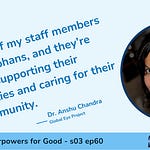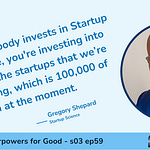Devin: What do you see as your superpower?
Tania: I love this question. I knew it was coming. I will say that I've been told that my superpower is my ability to empower and energize individuals.
“One in five kids, according to the CDC, are sexually abused by the time they’re 18,” says Tania Haigh, founder of the Kids Too Movement organized by Parents Against Child Sex Abuse (PAXA). The vast majority of perpetrators are men.
Tania notes that discussions of child trafficking may cause parents to shift their focus in the wrong direction. “The truth of the matter is that child sexual abuse is happening under our very noses,” she says. “In 90 percent of instances, it’s done by someone, the child and the family know. So it is someone—a trusted individual.”
Tania launched PAXA in 2017. Last year, she launched the Kids Too Movement with the hashtag #KIDSTOO to bring greater attention to the threat and build on the #MeToo movement.
Tips for Parents to Keep Kids Safe
Tania offers some tips to keep their children safe from sexual abuse.
Be aware that child sex abuse is common.
Engage with the organizations that have your children. From school to scouts and sports, Tania encourages parents to know who is with their children and how they protect children from harm.
Talk to your child annually, from about age two, in age-appropriate ways about the risks and dangers. Start by naming the body parts. Tell children, “If anyone touches you, tell mom and dad.”
Tania notes that this latter point is vital because predators typically have a specific age group to which they are attracted. Your two-year-old who is uninteresting to the predator in your circle may be a prime target at age six.
“In high school, it’s more about the predators going for relationships or convincing them that they’re in love,” she says. “It’s very complicated.”
Protecting Kids on Social Media
This isn’t 1998. You can’t just hope your kids are safe on social media. Kids are engaging at younger and younger ages, not just on Instagram and TikTok but also video game platforms like Roblox and chat apps like WhatsApp.
Tania advises parents to “get in there.” You have to monitor what your kids are doing.
Some apps have features that allow strangers who may fake their identity online, say by pretending to be closer in age to your children, to connect and communicate privately. Tania notes that you can turn off some private or direct messaging features in social media accounts. “Shut it down,” she says.
By allowing your kids to participate in the public side of social media, they can feel like they are engaging with their peers but be safer online.
“It’s not about being combative or removing the iPad,” Tania says. “It’s just putting limits, getting in there and shutting things down.”
Predatory Red Flags
“The other, even larger part of this is paying attention to the adults around your children,” Tania says.
She listed a few red flags:
The uncle that’s being the tickle monster
The older teen that has all this interest in playing with the littles in the basement
Friends of single moms who are eager to help with the kids
Men who isolate children at block parties
People who drink too much around children
PAXA advises Parents to learn more about red flags that could signal a threat to their children.
Symptoms of Child Sexual Abuse
The last thing a parent wants to imagine is someone abusing their child. But if you’re not watching for signs, it could go on indefinitely. Without treatment for the trauma, the impacts could be devastating and lifelong.
“As a parent, you always hear, oh, you know, this too shall pass. This is a phase. We don’t get a guidebook to raise our children,” Tania says. “Well, the truth of the matter is that when a child’s being traumatized through sexual abuse, there are behaviors that come out, and those also range by age.”
“With toddlers, their anger issues might be stronger, their tantrums might be more frequent,” she says. “They might not want to go into that into the tub or have a really hard time bathing, because anything that has to do with their clothes being taken off is incredibly triggering.”
Teens may start “closing the door more,” Tania says. “They don’t really talk to Mom and Dad, or they’re being more sneaking. These are things worth investigating before writing things off.”
“We encourage parents to dig in and add sexual abuse to the list,” she says. “I know it’s uncomfortable, but investigate.”
In this critical, sensitive work, Tania uses her superpower of empowering and energizing people.
How to Develop Empowering and Energizing People As a Superpower
The work Tania leads is emotionally challenging. Parents and other leaders of children often shy away from these difficult conversations.
“I think you can feel my energy and my passion like that when we’re empowering a grassroots group of parents who are just at their wits, and they can’t wrap their head around the news that a favorite teacher has abused a child,” Tania says of her approach.
By empowering and energizing people to lean into difficult subjects, she helps protect children.
“Recently, we got invited to participate and to hold a parent town hall in one of our neighboring suburbs in the Chicagoland area, where there’s a prestigious high school that was having issues on teen on teen assault,” Tania says. “There was a lot of silence around the topic.”
Parents were lost, not knowing what to do. Tania led the community through an educational process that helped parents understand what was happening and how they could keep their children safe. She gave the parents the tools they needed.
That’s the key to empowerment. She says it is content-driven. By providing parents with actionable information, she empowered them to act.
In the Chicagoland situation, she brought in experts, including a private investigator with 50 years of experience and an activist parent who had successfully lobbied the legislature and was a survivor of educator abuse. Parents left knowing what they could do, no longer feeling helpless.
The second key to empowerment is practice. Tell five people about what you want to empower them to do. “That starts flexing that muscle,” she says.
By following Tania’s example and advice, you can make empowering and energizing people a superpower for good.














